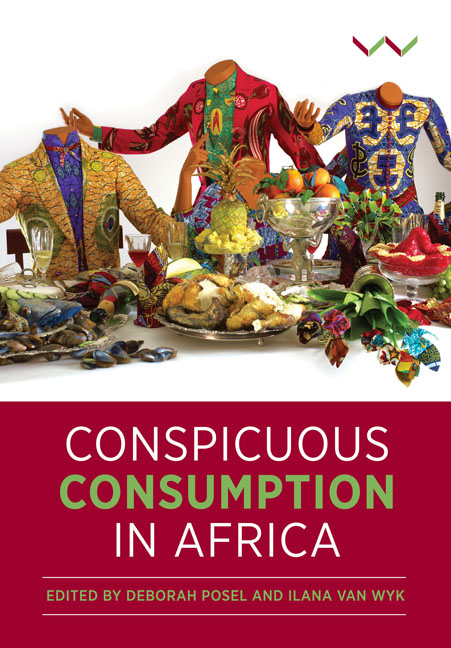Book contents
- Frontmatter
- Contents
- Acknowledgements
- List of Illustrations
- 1 Thinking With Veblen: Case Studies From Africa's Past and Present
- 2 Changes in the Order of Things: Department Stores and the Making of Modern Cape Town
- 3 Conspicuously Public: Gendered Histories of Sartorial and Social Success in Urban Togo
- 4 Etienne Rousseau, Broedertwis and the Politics of Consumption Within Afrikanerdom
- 5 Recycling Consumption: Political Power and Elite Wealth in Angola
- 6 Chiluba's Trunks: Consumption, Excess and the Body Politic in Zambia
- 7 Jacob Zuma's Shamelessness: Conspicuous Consumption, Politics and Religion
- 8 Precarious ‘Bigness’: a ‘Big Man’, His Women and His Funeral in Cameroon
- 9 Young Men of Leisure? Youth, Conspicuous Consumption and the Performativity of Dress in Niger
- 10 Booty on Fire: Looking at Izikhothane With Thorstein Veblen
- 11 Conspicuous Queer Consumption: Emulation and Honour in the Pink Map
- 12 The Politics and Moral Economy of Middle-Class Consumption in South Africa
- 13 Marigold Beads: Who Needs Diamonds?!
- Contributors
- Index
13 - Marigold Beads: Who Needs Diamonds?!
Published online by Cambridge University Press: 29 October 2019
- Frontmatter
- Contents
- Acknowledgements
- List of Illustrations
- 1 Thinking With Veblen: Case Studies From Africa's Past and Present
- 2 Changes in the Order of Things: Department Stores and the Making of Modern Cape Town
- 3 Conspicuously Public: Gendered Histories of Sartorial and Social Success in Urban Togo
- 4 Etienne Rousseau, Broedertwis and the Politics of Consumption Within Afrikanerdom
- 5 Recycling Consumption: Political Power and Elite Wealth in Angola
- 6 Chiluba's Trunks: Consumption, Excess and the Body Politic in Zambia
- 7 Jacob Zuma's Shamelessness: Conspicuous Consumption, Politics and Religion
- 8 Precarious ‘Bigness’: a ‘Big Man’, His Women and His Funeral in Cameroon
- 9 Young Men of Leisure? Youth, Conspicuous Consumption and the Performativity of Dress in Niger
- 10 Booty on Fire: Looking at Izikhothane With Thorstein Veblen
- 11 Conspicuous Queer Consumption: Emulation and Honour in the Pink Map
- 12 The Politics and Moral Economy of Middle-Class Consumption in South Africa
- 13 Marigold Beads: Who Needs Diamonds?!
- Contributors
- Index
Summary
It is day one of the 2016 Johannesburg Art Fair and the 12 drawers, three freestanding glass display stands and ten wall-mounted units for the Marigold hand-loomed beaded necklaces have already been replenished with fresh stock after the frenzy of the opening event the night before.
Replenishment of the supply happens frequently over the coming three days of the Fair, in response to the waves of consumers. Discerning and focused, many return repeatedly over the course of the event to enjoy and inspect the changing displays. Each new purchase seems to inspire or inform the next – as if these necklaces need each other.
The booth at the Art Fair, a shocking-pink cubicle, is shared with the Friends of JAG (Johannesburg Art Gallery) and has been tightly conceptualised to draw connections between genres of art, design, craft and adornment. The Friends of JAG – at the Fair to raise awareness of their important collection and to increase membership – present a fine example of an Ndebele nyoga (a beaded bridal train) and a pair of umlingakobe (‘long tears’ or head hangings, worn by mothers whose sons are at initiation school). Seen in relation to these earlier Southern African examples, and echoing in some way their form, the Marigold necklaces are presented as contemporary manifestations of traditional beadwork objects possessing a shared but different use-value (in that they are both worn) and symbolic value (in that they both express particular kinds of social status). A new limited edition design, directly inspired by the work of Serge-Alain Nitegeka, a featured artist at the Fair, is also presented.
The Friends of JAG happens to be directed by iconic South African fashion designer and arts activist Marianne Fassler, and as a result, the booth exemplifies high style: distinctive pink walls, designer furniture, wall texts, long slim mirrors, a single green leaf in a mid-century, violet-coloured glass vase and a large-scale stylised moody photograph of a model draped in Marigold beads with just one necklace extended between her outstretched arms. A tightly curated space, it creates a particular kind of platform for viewing the beads.
For three days, visitors to the Art Fair stop in at the booth to make their choices. Many are familiar with the necklaces and already hold significant existing collections.
- Type
- Chapter
- Information
- Conspicuous Consumption in Africa , pp. 214 - 230Publisher: Wits University PressPrint publication year: 2019



